Marnie Slater
Marnie Slater

Girls Like Us #14 - Letters of Disappointment
Marnie Slater, Katja Mater and 2 more
Considered an ‘ugly feeling’ by society’s norm, we’re not supposed to vocalize what and who is letting us down. We’re supposed to stay positive, get organized and act, instead of lingering in negative emotions. We’re supposed to be productive. But making space for disappointment can be a strategy of dissensus. Instead of wallowing in impotence, to make explicit what is not meeting expectations for this world can be an act of renouncing and making cracks in the status quo, while not giving up allegiance that another world is possible.
In Living a Feminist Life, Sara Ahmed writes: ‘we might think of how becoming feminist put us in touch with all that sadness, all those emotions that represent a collective failure to be accommodated to a system as the condition of possibility for living another way.’
In this issue we hope to plant the seeds of this rebellion by collecting a larger body of letters of disappointment. No matter how vague, impersonal, unimportant, futile, banal, or contingent these memories may seem; when shared and brought into a wider collective context, political desire may slip out from between the lines and build a corpus of transfeminist inheritance.
While spending some time with a tarot deck in preparation for this issue we obviously pulled the card of disappointment. In this deck, the illustration shows a beautiful drought: five crystal cups, which in the other cards overflow with fresh water, are shown here empty and dry.
‘The Five of Cups stands for an emotional crisis. It might be that unconscious fears come true, it could tell that feelings are disrupted or wasting away, the soul is empty and unfulfilled. In the sequence of the cups, the Five is the logical consequence of the Four. The grey tristesse that was lurking behind the luxury’s glamour is now exposed, the ‘truth is out’. The Five of Cups implies the loss of illusion, the realization of a deception. It hurts, but is necessary when we don’t want to spend the rest of our lives with our heads in the sand.’
We leave it up to you to imagine the possibilities or boundaries of what spending time with disappointment can make happen, for you, in your community, in the world.
Contributors: Pelumi Adejumo, Clara Balaguer, Dagmar Bosma, Staci Bu Shea, Alba Clevenger, Athena Farrokhzad, Sharona Franklin, Maike Hemmers, Calla Henkel, Sara Kaaman, Alena Kolesnikova, Maoyi (Peixuan Qiu), Katja Mater, Yelena Moskovich, Djuwa Mroivili, Sands Murray-Wassink, Raoni Muzho, Iarlaith Ni Fheorais, Ashley Nkechi Igwe, Milica Trakilović, Shola von Reinhold, Selma Selmani, Terre Thaemlitz, Yin Yin Wong, Anna Zvyagintseva, Sophie Zwertbroek, Joanna Walsh, Rosa Luxemburg, Yoyes Maria Dolores Gonzalez Katarain, Clara Zetkin, Alexandra Kollontai and Audre Lorde

Girls Like Us #5 - Play
Marnie Slater, Katja Mater and 2 more
In a world with too many choices and too little time to explore, play is an excellent strategy. Objects, roles, bodies, settings – anything can be transformed in play. Playing across time, space, architecture, beds, houses, lives, papers. Suddenly a chair is a plane is a stroy is an animal is an avatar is a new reality. Making up worlds, filming them. Surfing warm and cold waves. Playing with identities. Playing en masse. Playing to be free.
A digital conversation with performance artist boychild, writer Chris Kraus on beer brewing and BDSM, music producer and artist Fatima Al Qadiri on her 1989 haircut, Californian surfers by Eve Fowler & Mariah Garnett, curator Annick Kleizen recapturing the artist residency circuit from a hammock in Brazil, artist Jesse Darling paraphrasing Drake, musicians The Knife dissecting their communal experiment ‘Shaking The Habitual’ through the eyes of their collaborators.
Featuring Boychild, Chris Kraus, Wu Tsang, Jesse Darling, Fatima Al Qadiri, Jam Rostron, Marit Östberg, Hanne Lippard, Kapwani Kiwange, Maroussia Rebecq, Kenji Minogue, Mariah Garnett, Eve Fowler, Lily van der Stokker, Rachel de Joode, Mademoiselle Yulia, Katja Mater, Sarah Forbes Keough, Annick Klezine, Emily Roysdon, Analisa Teachwroth, Jess Arndt, Martin Falck, Laura Davis, Mandy Pernell, Amy Sillman and Jesper Strombäch Eklund.

Girls Like Us #9 - Dance and dancing
Marnie Slater, Katja Mater and 2 more
DANCE AND DANCING explores the New York dance scene – past, present and future. It’s our first ever guest-edited issue compiled by New York based writer and artist Emma Hedditch.
Featuring: Mariana Valencia, Cynthia Oliver, Marlies Yearby, Laurie Carlos, Chrysa Parkinson, devynn emory, the skeleton architecture, Discwoman, Svetlana Kitto, Jonah Groeneboer, Dona Ann McAdams, Lydia Okrent, Kim Brandt, kara lynch, Effie Bowen, Mary Manning, Res, Leah Gilliam, Amelia Bande, Luciana Achugar, Emily Wexler, Ayo Janeen Jackson, Suzan D. Polat, Mina Nishimura, Ursula Eagly, Emmakate Geisdorf, Angie Pittman, Lerato Khathi, Yvonne Meier and Aunts.
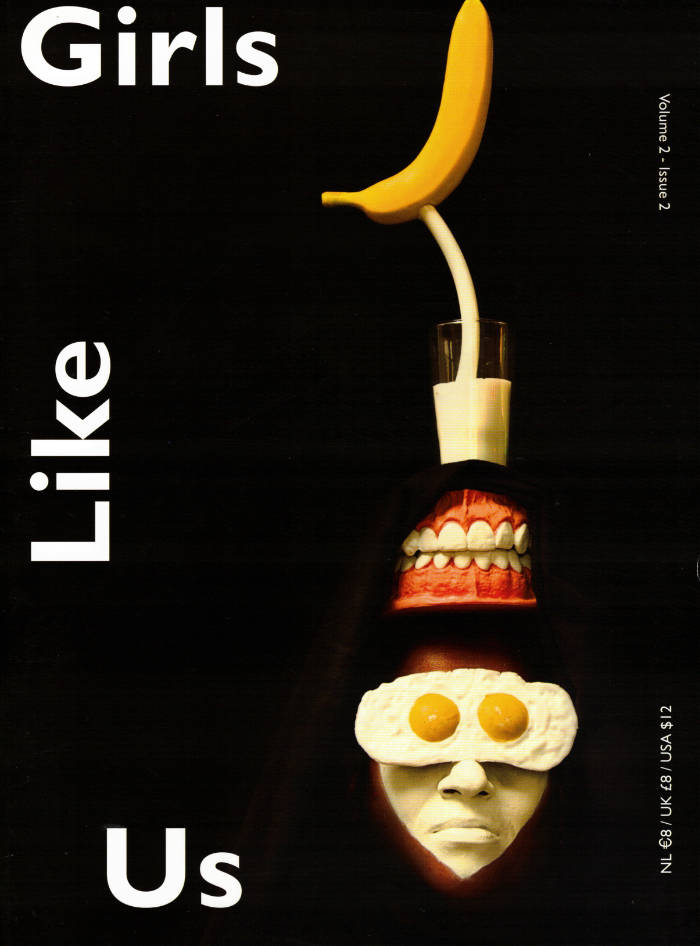
Girls Like Us #2 — Issue 2
Marnie Slater, Katja Mater and 2 more
The second issue of the Amsterdam lesbian arts quarterly with newly appointed co-editor Vela Arbutina at the helm.
Features include Vava Dudu and Theo Mercier, Tavi Gevinson and Diane Pernet, Keren Cytter and Dafna Maimon, Lauren Flax and Lauren Dillard, Kaisa Lassinaro, Matthew Lutz-Kinoy, Leilah Weinraub, Benjamin A. Huseby, Eline McGeorge, Janis Pönisch, Anie Stanley, Andrea Ferrer, Devrim Bayar.
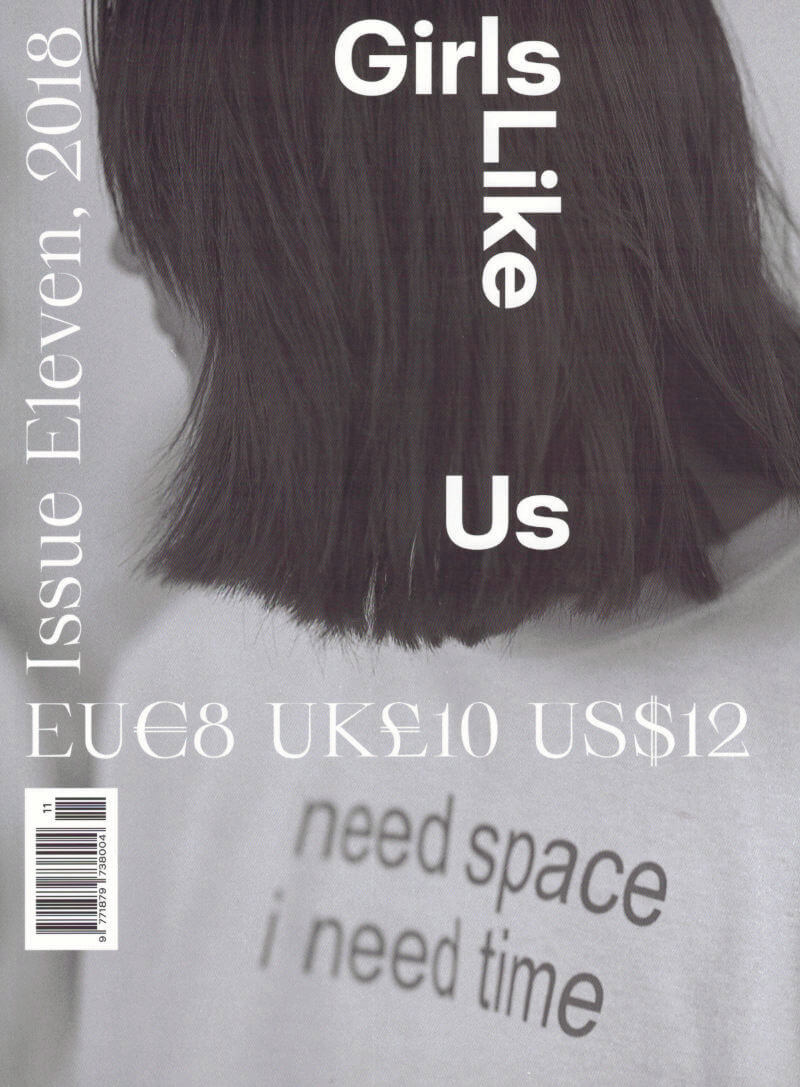
Girls Like Us #11 - Economy
Jessica Geysel, Sara Kaaman and 2 more
Framed as inescapable, indescribable, uncontrollable and essential, economies are everywhere. Oppressive and enabling, lucrative and undervalued, there are economies that trade our emotional labour, desires, love, fertility, time, minds, queerness, politics and clicks. There are economies that we can control and that control us, and those that we can subvert to serve our collectives. A mark, a yen, a buck or a pound, in a conversation with a cat, an app-enabled journey through a rainy Shanghai night, in the margins between intimacy and power, in the kitchen, with your record collection, under the tip of the iceberg, at the foot of a tower she built, dancing at the lesbian bar.

Girls Like Us #10 - Future
Jessica Geysel, Sara Kaaman and 2 more
We want a future outside of straight time. A future in which all our friends and lovers and their lovers are coming over for dinner around a table we built together. We want a future that is fair, fun, furry, fabulous, fierce, free and not fucked up. We want futures.
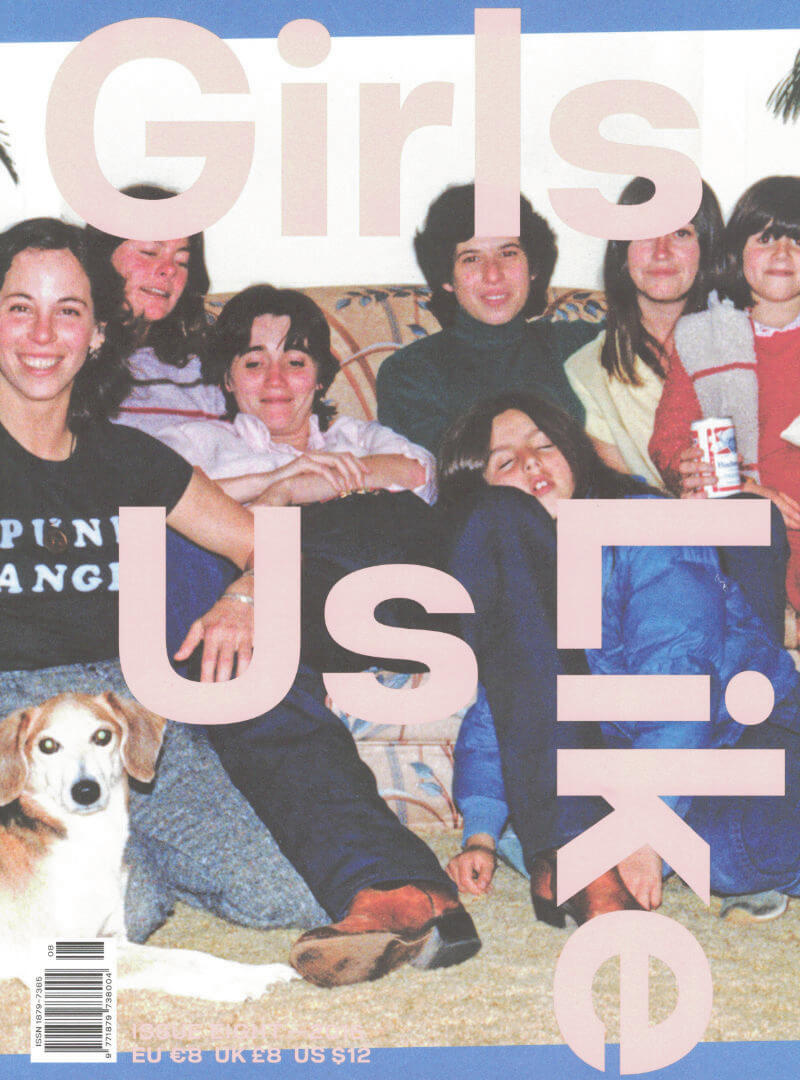
Girls Like Us #8 - Family
Jessica Geysel, Sara Kaaman and 2 more
Dear Lovers, Sisters, Brothers, Mothers, Adopted Aunts, Long Lost Fathers, Half-cousins, Wives, Black Sheep and Partners In Crime
As you know, we have a soft spot for collectives, collaborations, friendships and support structures. People doing things with other people: loving, working, organizing, living. These strategies for surviving together form an underlying thread throughout all our issues. This time we wanted to look more closely at one way of naming these friendly constellations: FAMILY.
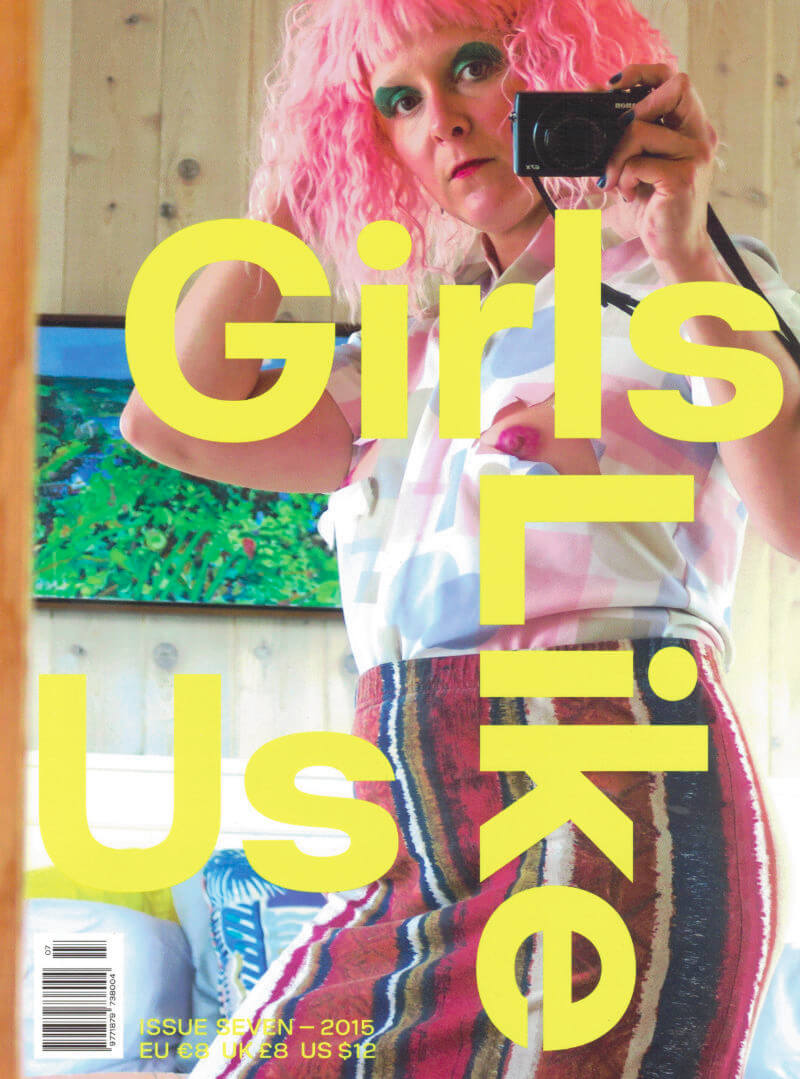
Girls Like Us #7 - Body
Marnie Slater, Katja Mater and 2 more
120 pages exploring the body and bodies, inside out and outside in. Bodies that dance and move. Bodies making waves. Body double. Bodies at work and working with the body. Using the body as an instrument. The body as medium and massage of touch and being touched. The single, singular body as the very basis for a ‘we’.
Interviews with image ingenue K8 Hardy, filmmaker Babette Mangolte, writer Jina Khayyer and documentarist Mariah Garnett. Essays by Derica Shields and Crystal Campell. Plus 7 Q&A's with healers, herbalist and modern witches. Beautiful bodily artists series and last but not least – horoscopic aphrodisiacs.

Girls Like Us #6 - Secrets
Jessica Geysel, Sara Kaaman and 2 more
A secret can be a private space for self-creation – or a shared site of pleasure.
We explore secrets in a plethora of forms and contexts. From layered accounts of mediaeval ecstasy to the unexplored sensory experience of smell. From camouflaged play to queer readings of astrological charts and the hidden history of house music. From a very analog point of view to the outskirts of the internet.
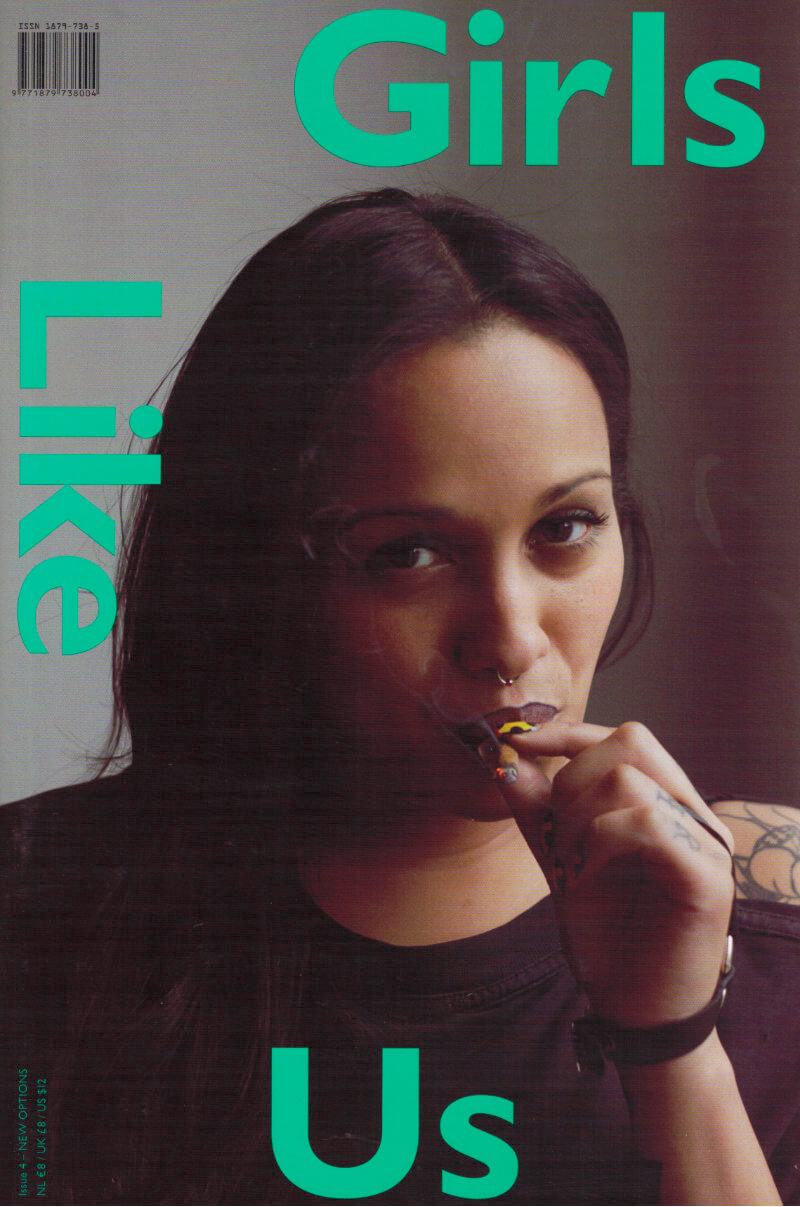
Girls Like Us #4 - New Options
Jessica Geysel, Sara Kaaman and 2 more
These days, if you call someone to go for a drink or a walk in the park, the obvious answer is: 'Sorry, I'm too busy'. Too busy with what? What do you do all day in your studio or office, bar or dancefloor, spending precious time on 'work'? And what makes it different from labouring? Do we slave for money – or no money – building on a system that is doomed to collapse? Or do we build on a new future where work and play are equal? When we work on our own initiatives and with a self-generated goal, would that still be called work? In this issue: other voices, other routes.
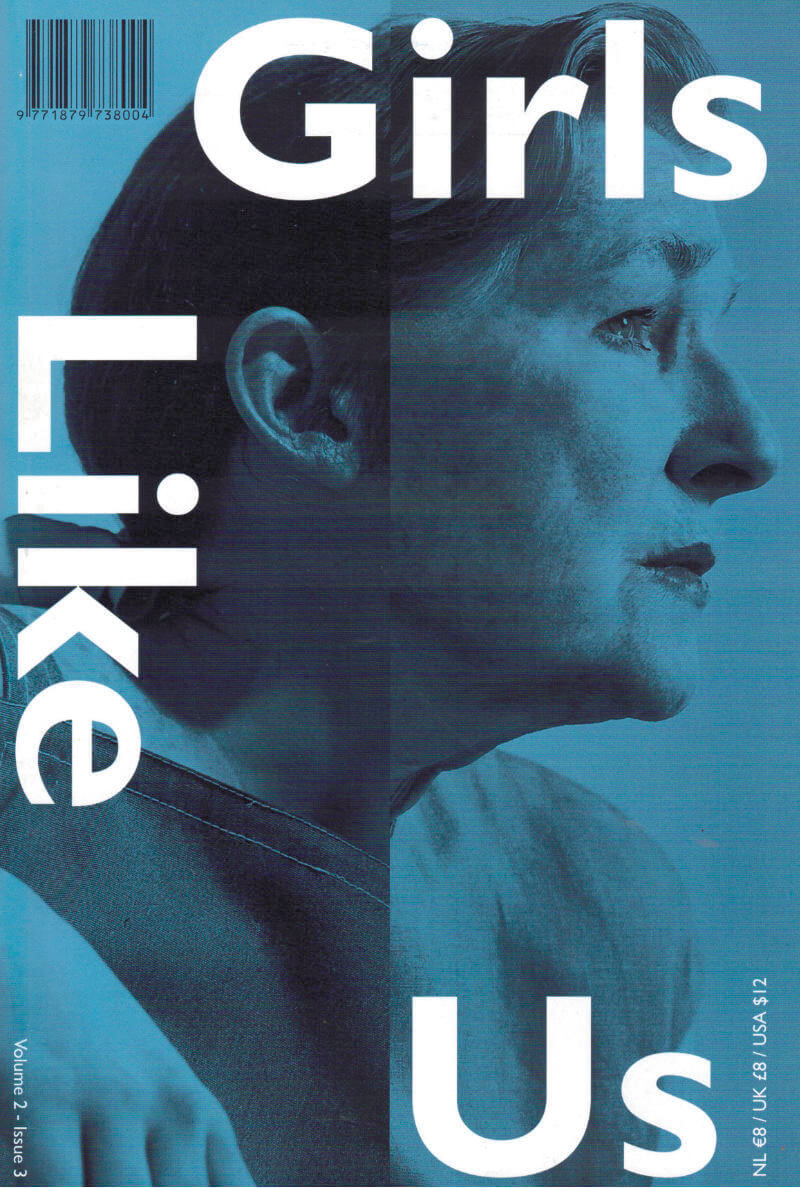
Girls Like Us #3 - Generations
Marnie Slater, Katja Mater and 2 more
Featuring Alice Carey, Anna Franceschini, Lizzie Fitch, Devin Blair, Kim Gordon, Annika Henderson, Melanie Bonajo, Marie Branellec, Elizabeth Orr, Holli Smith, Joke Robaard Litia Perta and Marie Karlberg.

Girls Like Us #12 - Biography
Marnie Slater, Katja Mater and 2 more
Life not as singular and individual, but entangled and connected.
Featuring a poem by Hanne Lippard, an interview with Dope St Jude, 6 Q&A's with IG Meme LGBTQ+ accounts, Selected Objects from the Museum of Trans Hirstory’s ‘Trans Hirstory in 99 Objects’ by Chris E. Vargas, an interview with Marilyn Waring, BUTCHCAMP, an essay Nina Lykke, (radical) self-care: biography of a network, a fashion shoot 'Gluck, Hig, Tim, Grub, Peter' photographed by Ilenia Arosio, an essay by Nadia Hebson, WICKED TECHNOLOGY/WILD FERMENTATION by Sara Manente, a Second Skin Harness by Sara Manente, Inju Kaboom and Gunbike Erdemir, Feminism, He-Yin Zhen and Reconceptualizing China’s History: A Brief Comment by Rebecca E. Karl, Thunderclap by Amy Suo Wu, an interview with Amy Sillman by Melissa Gordon, Some Women Want to Have Their Cock and Eat It To by Jill Johnston, (Post)Menopausal Graphic Design Strategies by Rietlanden Women’s Office and the essay Sex in Texas, anticipated by Lili Reynaud-Dewar.
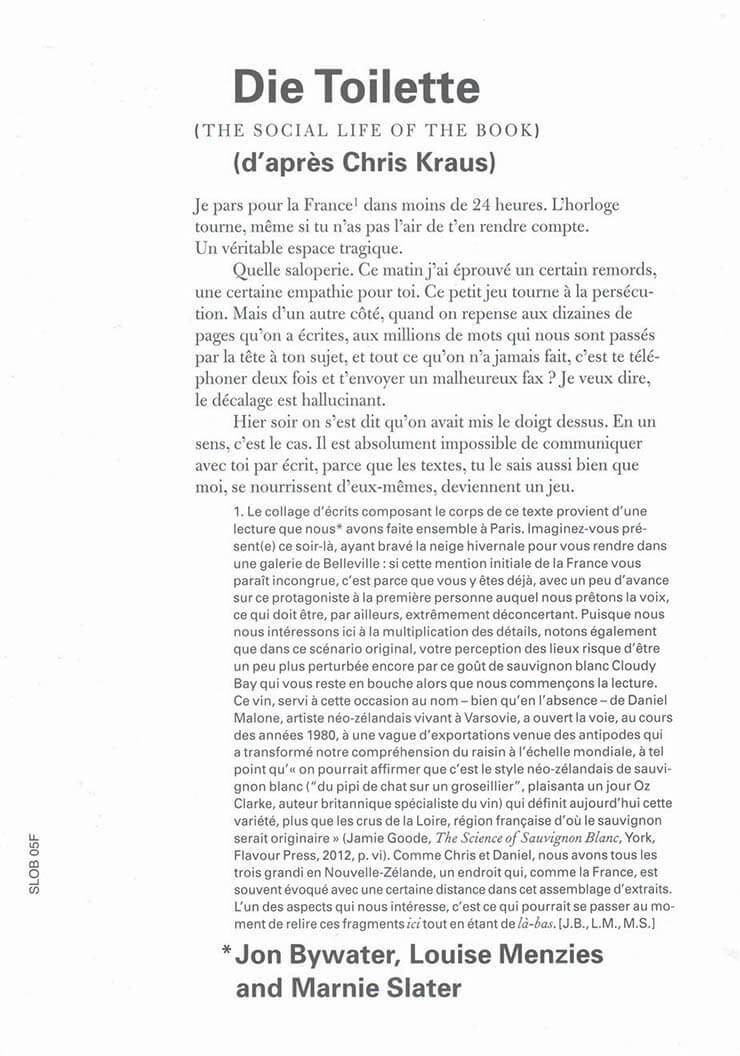
Die Toilette
Marnie Slater, Louise Menzies and 1 more

These are the tools of the present
Mai Abu ElDahab, November Paynter and 1 more
This publication comprises a series of interviews with contemporary artists, musicians, and writers who are in dialogue with Beirut and Cairo. While not purporting to be an overview of the art scenes in these cities, this book begins to draw a picture of how artists think about what it means to be active in the contexts of these cities. It offers insight into the circumstances that structured these artists’ stories, and the often accidental influences that have shaped how their practices have developed.
And more

Can We Rule It Out? Collective Ideas for keeping sexual abuse out of art spaces
Habiba Effat, Naira Antoun and 1 more
“With this collection of texts, reflections, questions, documents, we invite our readers, colleagues, and peer organizations to engage in difficult, often fraught, discussions about sexual abuse in art spaces. We do not want these conversations to always start at zero, as if a lot of work around sexual abuse hasn’t been done already. There is copious activism, scholarship, and creativity on this topic, if one wants to find it. What this publication would like to do is contribute to the work that has already been done and to be a waypost toward what remains to be done.”
Commissioned and edited by: Karim Kattan and Mai Abu ElDahab
Contributors are Adam HajYahia, Habiba Effat, Karim Kattan, Mai Abu ElDahab, Marnie Slater, Naira Antoun, and Salma El Tarzi
Notes compiled and written by Ahmed Medhat, Marina Samir, Nana Abuelsoud, and Salma El Tarzi, with edits and comments by Sahar Mandour
Translation from Egyptian Arabic of “Notes on Justice” by Yasmine Haj
Copyedited and proofread by Jenifer Evans
Designed by Loraine Furter and Naïma Ben Ayed
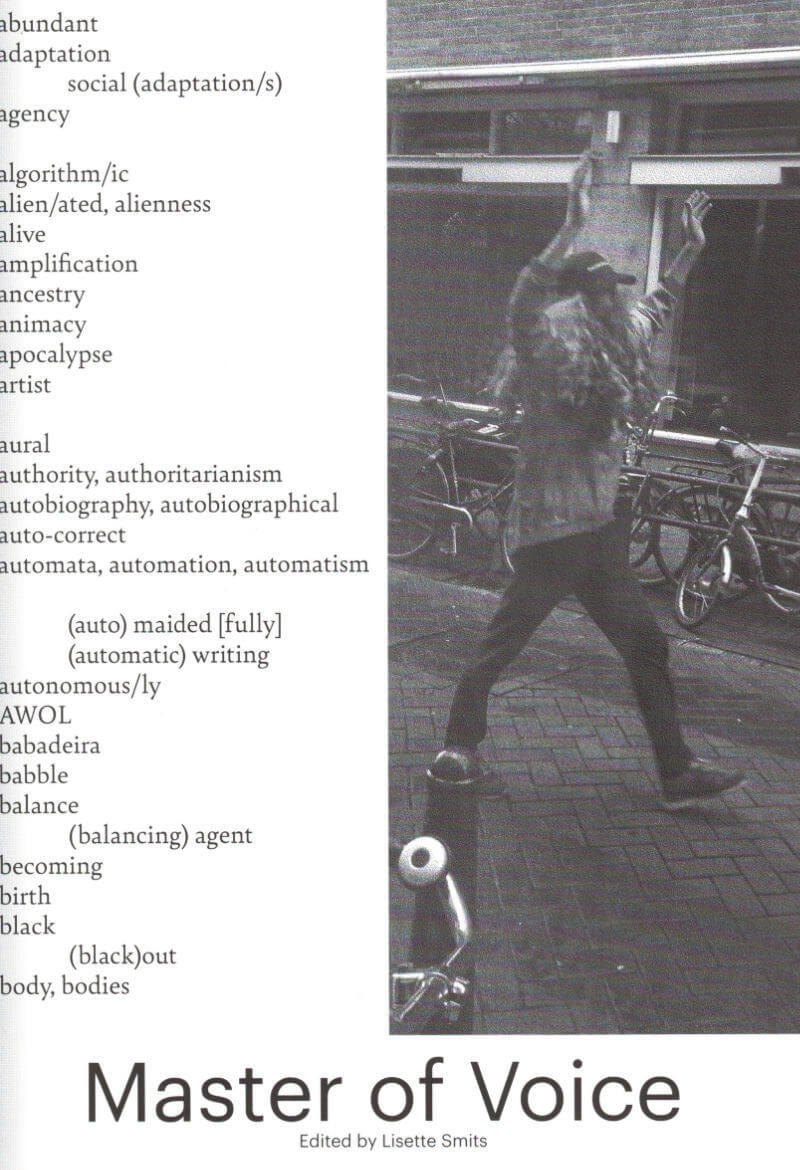
Master of Voice
The question of the voice and its prominent role in our postindustrial society.
The (non)human voice has always been part of modern art, notably within performance art, sound art, and conceptual art. However, Master of Voice temporary master program at the Gerrit Rietveld Academy, Amsterdam, mutated from this history, examining the voice as a unique “discipline.” The graduate program's focus was on the (non)human voice as a means to an end or an end in itself within artistic practice. A special orientation of the curriculum, co-developed with a team of artists with a longstanding interest in the (non)human voice, is the voice in relation to technology and gender. This book captures a two-year-long period of research—of thinking, talking, sharing, learning, making, acting, and creating by students and teachers, artists, and other practitioners—to find possible answers and approaches to the question of the voice and its prominent role in our postindustrial society.
Contributions by Tyler Coburn, Angelo Custódio, Thom Driver, Paul Elliman, Amelia Groom, Miyuki Inoue, Danae Io, Jamila Johnson-Small, Bin Koh, Snejanka Mihaylova, Maria Montesi, MPA, Natasha Papadopoulou, Duncan Robertson, Marnie Slater, Cécile Tafanelli, Mavi Veloso, Geo Wyeth, Eva Šusová.
Graphic design: Juliette Lizotte.
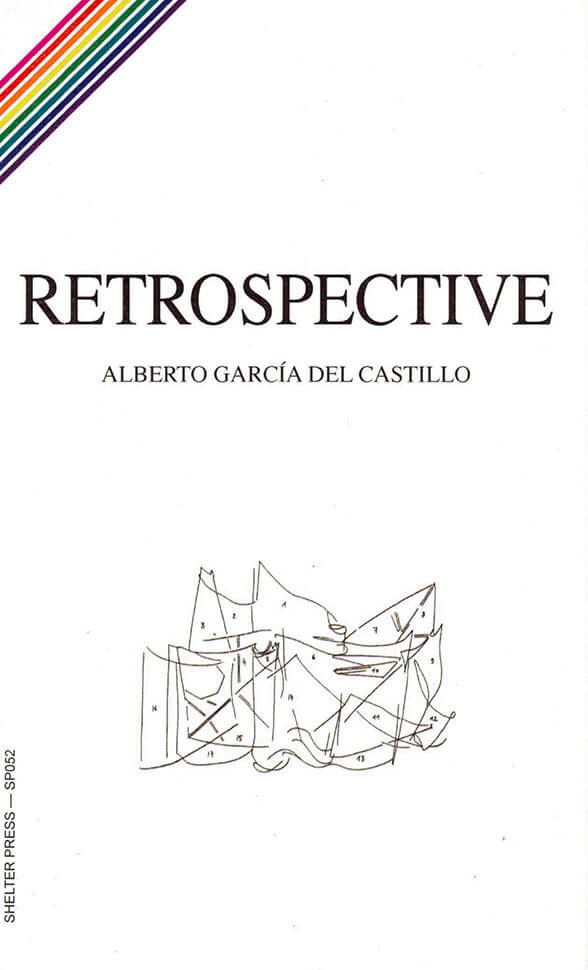
Retrospective
Retrospective is a comedy-science-fiction novelette about “faggotry” and the art world; depicting a retour-au-passé in contemporary painting and waving to some of the most beautiful homosexuals on Earth. Flaunting otherness, the alert reader can follow a clerk of The Land of Sculptures whilst he encounters the pretty faces of The Painter, The Foreign Painter, The Tyrolese Painter and other people doing art and drugs.
Retrospective includes “Thumbs-Up”, a superficial analysis of the normalisation of gayness; “Why Homos Are Better”, a masterpiece of investigative journalism in two parts, that originally appeared in Agony 2 (circa 1988–93), a zine edited by B. Boofy and William Bonifay; a drawing by Jurgen Ots; a photograph by César Segarra; and a poem by Lars Laumann.
Alberto García del Castillo writes genre fiction and nonfiction about communities and queer, performs his own and other people's writings, and collaborates in multiple configurations. He has published his writing in Girls Like Us, co-edited Midpoint (Théophile's Papers, 2016) and his two novels Merman (2017) and Retrospective (2014) were published by Shelter Press. Alongside Marnie Slater, is co-curator of Buenos Tiempos, Int.

Midpoint Cafe
This book portrays a slice of the history of Midpoint Café and Bar in Brussels from 2011 until today, through interviews with one of its owners and a few of the regulars.
Midpoint is a book of interviews with Fatma Arar, Nick Bastis, Carles Congost, Gro Gravås, Jean-Paul Jacquet, Lars Laumann, Stefanie Snoeck, Harald Thys and Margot Vanheusden.
Edited by Laure Charles, Alberto García del Castillo, Louise Osieka and Marnie Slater.